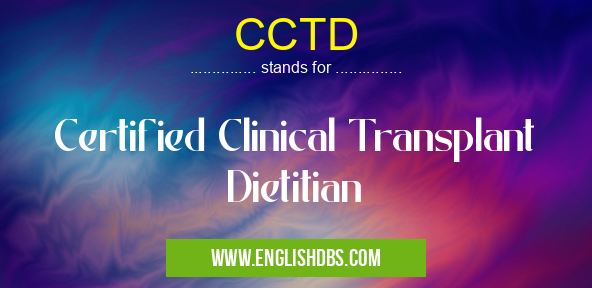What does CCTD mean in TRANSPLANTATION
A Certified Clinical Transplant Dietitian (CCTD) is a type of registered dietitian who has specialized training in the nutrition management of transplant patients before, during and after an organ or tissue transplant. CCTDs work with other healthcare providers to optimize patient health and well-being post-transplant.

CCTD meaning in Transplantation in Medical
CCTD mostly used in an acronym Transplantation in Category Medical that means Certified Clinical Transplant Dietitian
Shorthand: CCTD,
Full Form: Certified Clinical Transplant Dietitian
For more information of "Certified Clinical Transplant Dietitian", see the section below.
Essential Questions and Answers on Certified Clinical Transplant Dietitian in "MEDICAL»TRANSPLANTATION"
What does a CCTD do?
A Certified Clinical Transplant Dietitian develops individualized nutrition plans and educates transplant patients on proper nutritional practices in order to ensure optimal post-transplant outcomes. CCTDs provide overall advice regarding a range of nutrient-related topics, such as optimal dietary selection and the potential need for vitamin and mineral supplements.
How can a CCTD help me manage my nutritional needs following a transplant?
A Certified Clinical Transplant Dietitian can provide individualized nutrition recommendations based on your medical history, lifestyle, current dietary intake, body composition and laboratory values. A CCTD also monitors vital signs and laboratory tests to identify any nutritional deficiencies or issues that may influence your recovery.
Is it important for me to have regular visits with a CCTD?
Yes. Regular visits with a CCTD are essential for ensuring proper management of your dietary needs following a transplant, as well as preventing any further complications related to nutrient deficiency or malabsorption. During these visits, your CCTD will measure changes in body composition and laboratory values in order to adjust your nutrition plan accordingly.
Are there any other services provided by a CCTD?
Yes! In addition to developing individualized nutrition plans and monitoring vital signs/laboratory tests, CCTDs also provide nutrition education tailored to each patient's specific needs, including guidance on how to identify and select healthy foods while avoiding potential food-drug interactions that could negatively affect recovery. They may also offer counseling regarding weight management prior to surgery as well as lifestyle modifications required for successful long-term health following transplantation.
Does insurance cover my visits with a certified clinical dietician?
Most insurance policies typically cover at least some portion of the cost associated with visiting a certified clinical dietician; however, coverage varies depending on your policy provider so it is best to check directly with them first.
Final Words:
For those undergoing an organ or tissue transplant, consulting regularly with a Certified Clinical Transplant Dietitian (CCTD) is an important part of ensuring successful long-term health post-transplantation. From developing individualized diets plans to providing ongoing nutrition education tailored specifically towards post-transplant needs, CCTDs are invaluable resources when it comes to optimizing patient health both pre- and post-surgery.
